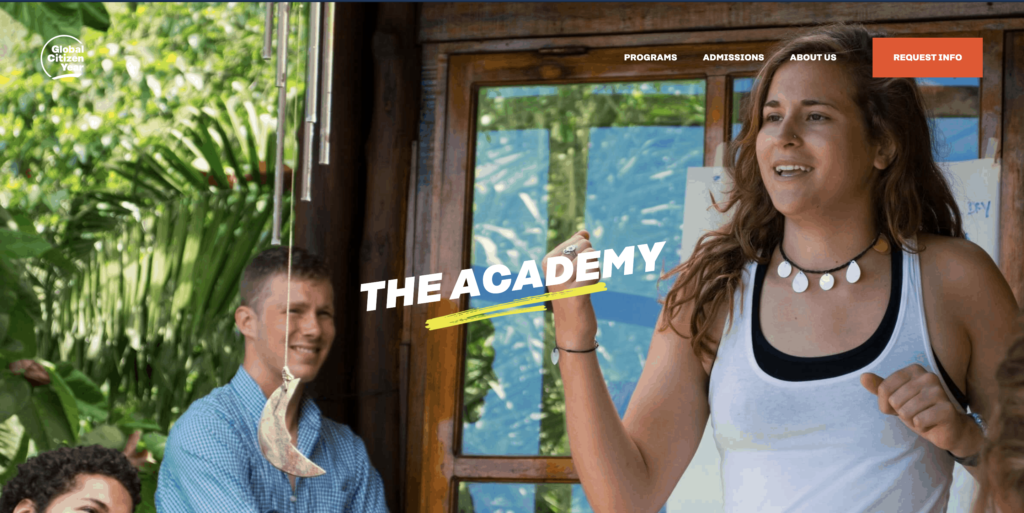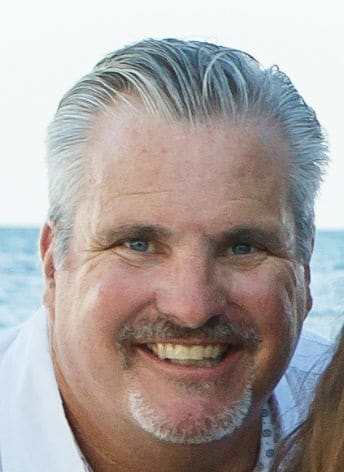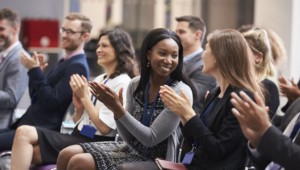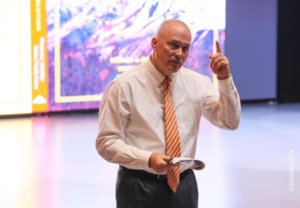Global Citizen Year Sets 5-Year Mission To Produce 10,000 New Young Leaders

When it comes to overcoming our shared global challenges, there are surely many windows of opportunity. Well, according to Global Citizen Year’s Founder & CEO Abby Falik, 2020 produced one of the clearest, brightest views yet.
Global Citizen Year – which just celebrated their 10th anniversary – has become known for providing a “gap year” experience like no other. Their signature Fellowship experience has already graduated 1,000 Fellows. For the equivalent of a school year, Fellows live and work alongside the global majority in communities across Africa, Asia and Latin America. Through coaching, a cohort and a curriculum Fellows return home with empathy, confidence and a sense of purpose that can’t be learned in a classroom alone.
The COVID-19 Pandemic could have permanently derailed Global Citizen Year. However, like many innovative social enterprises, they pivoted and launched a new offering known as The Academy. This is an intensive leadership experience, delivered virtually over 12-weeks to equip students worldwide with powerful skills for a lifetime of social impact. It’s designed as a 5-10 hour per week commitment that adds an enriching layer of purpose to students who may be working, traveling, finishing high school or beginning college.
The Why
According to Falik, today’s educational system shuttles students from high school to college without opportunities to reflect on who they are, what the world needs and how to build a meaningful life. She said Global Citizen Year re-imagines this transition into adulthood as what it has the potential to be: a transformation. The early evidence speaks for itself: students find their Global Citizen Years life-changing, parents say they’re priceless, and top colleges call them preferable.
Falik says there are multiple factors contributing to this urgent need to forge a new rite of passage for today’s emerging leaders. “The existential threats facing our future — from our climate crisis and racial injustice to populism and the next pandemic — are all global. But while our fates are entwined, our experiences are not,” said Falik. “We need a critical mass of leaders who are equipped to address these challenges. The future of humanity depends on it.”
Falik says this urgency is happening while there is also a realization – amongst students, parents and others – that our traditional systems and pathways are not addressing these needs.
“There’s a growing — and understandable — skepticism about the value of a traditional 4-year degree. A recent survey showed 50% of GenZ is questioning the value of college. We need new and better paths for young people to find their place and purpose in the world.”
Redefining Leadership
Falik also describes this nexus of global trends in terms of how young people are changing and adjusting to a rapidly transforming world. She said even though they might be in their traditional pathways of high school and college, students are beginning to acknowledge their collective feelings of isolation, disempowerment and hopelessness.
“GenZ is rightfully calling out the generations that came before them. Our culture has defined success too narrowly — focusing on profits and personal gain, often at the expense of people, and our shared planet.,” said Falik. “There’s a latent idealism and determination just waiting to be tapped.”
Falik acknowledges that there’s a historic opportunity to redefine leadership — not as a position, but as a practice.
“The younger one learns their power and ability to influence others,” said Falik, “the sooner become an engine for change.”
Falik also emphasizes that there is a set of global competencies that are integral in becoming the leaders we need now. She says that the things we used to refer to as ‘soft skills,’ — specifically empathy, agency and a global perspective — are quickly becoming the ‘power skills’ of the future. ’
“The world needs leaders who represent society’s diversity and who bring curiosity, conviction and courage to everything they do,” said Falik. While Global Citizen Year includes students from around the world — young people from 85 countries have participated to date — she sees a particular need for these experiences among students in the U.S.
“In the U.S.our lives and experiences remain so segregated,” said Falik. “The only way to overcome the things that divide us — inequity, injustice, polarization — is if we can prepare young people to connect across lines of difference.”
A Global Call To Action
With the future of higher education in flux, and growing demand for the type of leader Falik describes — from both colleges and employers — Global Citizen Year is seizing this moment by launching a historic campaign focused on meeting the critical mass of new, global leaders. Over the next five years, Global Citizen Year will:
- Launch 10,000 new leaders — a critical mass equipped to build a more just, peaceful, and sustainable world.
- Change the composition of our future change-makers. Access and inclusion are at the core to their mission: 80% of their alumni have received some level of need-based financial aid, 86% of their alumni from low income backgrounds have completed college or are on track to graduate, over 50% are Pell-grant eligible, and over 50% self-identify as BIPOC. For more information on their impact, see this latest Alumni Outcomes Report.)
- Activate a dynamic and recognized alumni network that has an outsized impact on society.
- Champion a new definition of leadership that puts people, purpose, and the planet ahead of personal gain.
This is taking shape in the form of an audacious, $50 Million New Leaders Fund. “Today we have the team, track-record and plan to scale our solution to the size of the problems facing our global community — and philanthropic capital will be the catalyst to increase our impact and influence exponentially.”
A Transformed Future
Although the Academy is just getting started, it’s already having tremendous impact. Falik said that the students — who come from 85 different countries in 10 different time zones — are already endorsing the transformational experience. Falik said that Global Citizen Year is having lots of conversations with high schools across the country about including the Academy as a foundational layer or capstone experience.
Falik said the entire effort to raise funds is about getting as many young people to have these powerful experiences. For her, it’s not just a mission, but really a global need focused on transforming education and leadership on a global scale.
“If we’re not careful, our social networks, technology and artificial intelligence will decide what the future looks like,” said Falik. “The only shot we’ve got to get in front of this is to prepare young people with the confidence, humility, agency and sense of purpose to make sure our future looks better than the present.”
For more, see:
- Leveraging the Gap Year to Solve the World’s Most Pressing Problems
- Invest In Your Own Journey: UnCollege’s Gap Year Program
- Taking Charge Of My Own Learning
Stay in-the-know with innovations in learning by signing up for the weekly Smart Update.




0 Comments
Leave a Comment
Your email address will not be published. All fields are required.